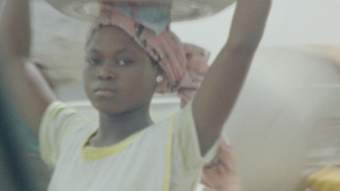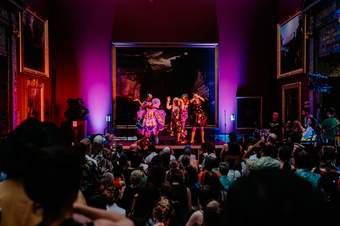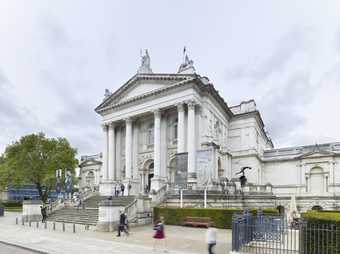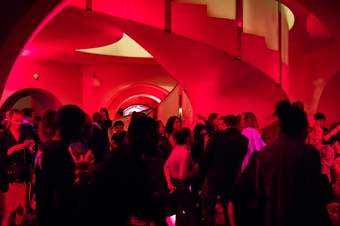Join us for an exciting three-week film programme at Tate Britain. Dive into themes of identity, cultural heritage and personal history. Watch films and hear conversations inspired by the works of the 2024 Turner Prize nominees Pio Abad, Claudette Johnson, Jasleen Kaur and Delaine Le Bas.
Connect with fellow creatives and engage in lively discussions, and discover new perspectives on what identity means today. This programme has been curated to celebrate the 40th anniversary of the Turner Prize.
This event has been co-curated with Amrita Dhallu, Kelly Rappelye and Ese Onojeruo.
Date: 27 January 18.30 - 21.00
Co-curated by Kelly Rappleye
Join us for an evening of films inspired by Turner Prize 2024 nominee Delaine Le Bas. Delve into themes of nationhood, land, and the search for belonging through the lens of nomadism and exile. The programme traverse borders and boundaries, offering profound reflections on migration, displacement, and cultural resilience. Vibrating with acts of transgression and radical care in the face of dispossession, xenophobia and bordering, these films reveal how dissident cultures, stories, and forms of knowledge are passed across generations and geographies, making home again and again. This programme has been curated by researcher/ curator Kelly Rappleye, who will join us to introduce the films.
Runtime
Batrachian’s Ballad (2016) 16 Minutes by Leonor Teles
When the Dogs Talked (2014) 33 Minutes by the Karrabing Film Collective
The Retreat (2023) 21 Minutes by Gelare Khoshgozaran
Olho da Rua (Out Loud) (2022) – 25 minutes by Jonathas de AndradeÂ
Future In Your Hands (2024) 15 Minutes by Romano Lav youth Filmmaking Group and Meray Diner
Batrachian’s Ballad (2016)
By Leonor Teles
Like the gypsies, ceramic frogs don't go unnoticed to a careful observer. Batrachian's Ballad comes about in a context of ambiguity. A film that intervenes in the reality of Portuguese everyday life, as a form of fabling about a xenophobic behaviour.
Future In Your Hands (2024)
By Romano Lav youth filmmaking group with Meray Diner Lena Popikova, Monika Ginova, Serena Gombarova, Paulina Gombarova, Naomi Schein and Adela Zbila.
Future in Your Hands is a short documentary by young Roma women in Glasgow, created as part of their ‘Community Catalyst’ training. The film explores the importance of education through interviews with their high school teachers and a Roma professional breaking stereotypes. The teachers explain how they try to work with Roma kids in order for them to achieve their goals; and explain that if the kids are willing to grow, they will help with anything they can.
Olho da Rua (Out Loud) (2022)
By Jonathas de Andrade
Olho da Rua [Out Loud] casts a temporary community of homeless people living in the streets of downtown Recife. Inspired by the techniques of Augusto Boal’s Theatre of the Oppressed, the film stages a series of performative acts that focus on collective dynamics and exercises of gaze in a public square. Bordering fiction and nonfiction, the aim was to engage the cast of nonprofessional actors in debates about identity, care, family, class consciousness, and social and political visibility through actions and words.
The Retreat (2023)
By Gelare Khoshgozaran
Exile as a space for transnational solidarity is explored through a discursive, community-oriented process of production centred around a retreat in the South of France. An international group of participants with distinct but shared experiences of displacement come together to find common language. Fragments of conversation are laced together with dream-like sequences reflecting on the connections between exile, mental health and modes of antifascist praxis.
When the Dogs Talked (2014)
By the Karrabing Film Collective
As a group of Indigenous adults argue about whether to save their government housing or their sacred landscape, their children struggle to decide how the ancestral Dreaming makes sense in their contemporary lives. Listening to music on their iPods, walking though bush lands, and boating across seas, they follow their parents on a journey to reenact the travel of the Dog Dreaming.
Date: 3 February 18.30–21.00
With special performance by performer and poet Chloe Filani
Celebrate the powerful representations of Black identity and the human form in Claudette Johnson’s art. These week focuses on personal and communal identity. Capturing the essence of individuality and cultural heritage.
Runtime
Adura Baba Mi (2024) 15 minutes by Juliana Kasumu
LA DEFENSE VOLUME I - PACIFIC CLUB (2022) 16 minutes by Valentin Nouaïm
The Exist Under Permanent Suspicion (2024) 14 minutes by Valentin Nouaïm
INSCAPE (2019) 2 minutes by Lilah Benetti
Les Somme De Nous (2024) by Lilah Benetti
Meanwhile on Set ... (2018) 15 minutes  by Jennifer Martin
O' Pierrot (2019) 14 minutes by Tanoa Sasraku
What Does the Water Taste Like? (2020) 8 minutes by Juliana Kasumu
Adura Baba Mi (2024)
By Juliana Kasumu
Intimate recollections by the filmmaker's father, a religious leader within the Celestial Church of Christ, and the filmmaker's mother, his once devoted wife.
LA DEFENSE VOLUME I - PACIFIC CLUB (2022)
By Valentin Nouaïm
In 1979, the Pacific Club was opened in the basement of La Défense - the business district of Paris. It was the first nightclub for Arabs from the suburbs; a parallel world of dance, sweat, young loves, and one-night utopias. Azedine, 17 years old at the time, tells us the forgotten story of this club and of this generation who dreamed of integrating into France but who soon came face to face with racism, the AIDS epidemic, and heroin.
The Exist Under Permanent Suspicion (2024)
By Valentin Nouaïm
Claire (Kayije Kagame), a businesswoman promoting a new skyscraper office in La Defense, faces increasing scrutiny and isolation. The cold, grey offices amplify her loneliness, driving vivid dreams of setting the tower ablaze.
Inscape (2019)
By Lilah Benetti
Inscape (2019) explores the impact physical spaces have on our reality: in it, Melbourne artist Akosia breaks free and decompresses in the landscape around.
Inscape is about living in a closed world, in the city, in a confined space; it’s me showing myself that I will eventually always break free.
Les Somme De Nous (2024)
By Lilah Benetti
A contemplative exploration of identity, moving beyond Western frameworks to reimagine our relationship with language, selfhood, and the intricate bonds between people and place. Over the course of a six month road trip, artist Lilah Benetti journeyed through Togo, Benin, Nigeria, Ghana, and Senegal, delving into the historical presence of gender non-conformity within traditional spiritual practices. At the same time, the work interrogates the complexities of contemporary political landscapes in these regions and examines the vital role of non-men in preserving and sustaining these traditions.
Meanwhile on Set…Ìý(2018)
By Jennifer Lauren Martin
As actors veer from the filmmaking process, break down and misbehave like viruses disrupting a system. In wearing full-body morph-suits, the actors become fully epidermalized – like the roles they inhabit, they slip in and out of these skins. Each segment aims to unpick a condition of acting for British black and black bi/multi-racial actresses.
O' Pierrot (2019)
By Tanoa Sasraku
The life goal of Pierrot Mulatto (played by the artist) is to catch a giant sycamore seed that spins down every day from the arms of Harlequin Jack, a crazed black man in whiteface, driven mad by his own quest for British acceptance. Jack toys with Pierrot throughout the story, performing a satirical essence of pompous English sensibility whilst referencing early minstrel troupes’ caricatures of the post-slavery, black populace. Mixed-race Pierrot is encouraged to strive for her ‘white potential’ whilst battling rejection, rage, and the bending of time amidst the English countryside.
Shot on 8mm film, with references to the aesthetic of Kenneth Anger’s Rabbit’s Moon, O’ Pierrot’s script is built upon a colliding of verses from the Jim Crow-era song ‘Jump Jim Crow’ and lesser-known passages from the British National Anthem.
What Does the Water Taste Like? (2020)
By Juliana Kasumu
What Does the Water Taste Like? questions the production of identity as it relates to the filmmaker's personal affiliations as a British-Nigerian. Prompted by intimate conversations, the film conjoins footage and voices of the past with their counterparts in the present-tense.
Date: 10 February 18.30–21.00
Explore how history reverberates through political histories and personal memories. Inspired by the work of Pio Abad. Unraveling the complex impacts of the past on present identities.
Reflect on how the remnants of history shape present identities. We invite viewers to consider the lasting impacts of our collective past.
Runtime
An Excavation (2022)Ìý 23 minutes by Maeve Brennan
Iranian Bag (2020) 8minutes by Maryam Tafakory
No Prospects / Change of Heart Special (2021) 15 minutes by Jennifer Lauren Martin
Red Jeep (2023) 5 minutes by Chanthila Phaophanit
Still House (2023) 5 minutes by Chanthila Phaophanit
Trinity (2021) 23 minutes by Hetain Patel
Reimagined RealitiesÂ
Date: 10th February 18.30 - 21.00
Co-curated by ´¡³¾°ù¾±³Ù²¹Ìý¶Ù³ó²¹±ô±ô³Ü
Inspired by Jasleen Kaur's use of gathering and remaking objects from everyday life. Through installation, she renegotiates tradition and collective myths. These films will explore cultural memory and political belonging. Through a captivating blend of textual and filmic collages. These works interconnect documentary, archival, and found materials. Consider how personal and collective histories influence our understanding of the world.
Inspired by DOWSER, a living archive of Scotland’s artists’ moving image, this session reflects on the act of mapping histories long shadowed or overlooked. With its third issue, Jugalbandi—a duet of two equally matched soloists in Indian classical music, meaning "entwined twins"—provides the perfect frame.
Alia Syed and Jasleen Kaur, through their single-screen works Points of Departure (2014) and Ethnoresidue (2020), respond to each other’s moving image practices. Their voices entwine, tracing connections between language, memory, and belonging.
History Reverberates
An Excavation (2022)Ìý
By Maeve Brennan
In 2014, 45 crates of looted antiquities were discovered at Geneva Freeport in a warehouse belonging to disgraced antiquities dealer Robin Symes. They contained tens of thousands of archaeological remnants worth around £7 million. Three of the crates were sent to forensic archaeologists Dr Christos Tsirogiannis and Dr Vinnie Norskov for research.
An Excavation (2022) documents Tsirogiannis and Norskov’s investigation into a series of vases from the Geneva Freeport crates. Made in the 4th century BC by Apulian artisans, these vases remained buried in tombs for 2500 years before they were clandestinely excavated from their now irrecoverable contexts. The objects’ journeys through the hands of looters, smugglers, restorers and dealers are counterpointed by the hand-painted stories that adorn them. Made for burials, the vases depict scenes from the underworld – forensic and mythological narratives start to intertwine.
No Prospects/Change of HeartsÌý(2021)
By Jennifer Lauren Martin
While we might treat reality TV dating programmes as cultural objects separate from our experiences, they impress us with ideas and enactments of contemporary dating. No Prospects/Change of HeartsÌý(2021) explores these televisual searches for love and reliance on algorithms to shape desires, the prevailing surveillance structure and the masochism of the early dating show ‘Change of Hearts’ (1998 - 2003). This research critiques reality television that approaches love through moralistic and corrective positions, questioning what happens when we collapse the personal and the public under surveillance.
Irani Bag (2020)
By Maryam Tafakory
Using excerpts from films produced between 1990 and 2018, Irani Bag is a split-screen video essay questioning the innocence of bags in post-revolution Iranian cinema.
​Irani Bag is part of Monographs, a series of essays on Asian cinema commissioned by the Asian Film Archive (AFA).
Red Jeep (2023)
By Chanthila Phaophanit
In Red Jeep Chanthila meditates on her father and ponders on a childhood myth. We are placed on the outside looking in on a story that reveals Lao's complex social and political history.
Still House (2023)
By Chanthila Phaophanit
Still House is a family ghost story retold. We peer into a conversation suspended in time as we journey through a tunnel - a space between and a space of potential. The story once told in Lao, translated into French, and then rendered into English raises questions about what is lost or transformed in the act of retelling. Chanthila is interested in the fractures created by translation—how stories shift and distort as they pass through languages and histories.
Trinity (2021)
By Hetain Patel
TRINITY is a shapeshifting nourish romance about 20-something MINA. By day, she holds down a professional job, and by night practices martial arts and creates body armour in her bedroom. A clash with a stranger triggers a supernatural occurrence that will draw her deep into the very ancestral traditions that she has been trying to escape.
History Reverberates: Reimagined RealitiesÂ
Latifah And Himli’s Nomadic Uncle (1992)
By Alnoor Dewshi
Follows the wanderings and wonderings of two South Asian women.
Fatima's Letter (1992)
By Alia Syed
A personal documentary around journeys, memories and watching, watching while journeying and remembering while watching – travelling through memories, places and events and documenting them into consciousness.
Points of Departure (2014)
By Alia Syed
The objects and places we cannot leave behind create the tapestry that is Points of Departure. Exploring themes of personal and collective memory through Syed relationship to the city of Glasgow, a voice over describes a tablecloth she retrieved whilst clearing her elderly father’s house. The film attempts to unravel the threads of memory held within this mundane item and to find an image within the BBC archive that relates to Syed memories of growing up in Glasgow.
´¡³¾°ù¾±³Ù²¹Ìý¶Ù³ó²¹±ô±ô³Ü
´¡³¾°ù¾±³Ù²¹Ìý¶Ù³ó²¹±ô±ô³Ü is a curator based in South East England. She provides support structures for artists through commissioning, publishing projects and creating artistic networks. She is currently reflecting on diasporic feminist practice (spatial and sonic) and the ways in which it reveals the systems of compliance and complicity within the British cultural institutional space.
Kelly Rappleye
Kelly Rappleye is a curator and AHRC/SGSAH PhD researcher at Glasgow School of Art and a 2024 Emerging Curators Group member. Her research and practice focus on contemporary art’s role in urban place-making and spatial politics, with particular interests in moving image and cultural memory.
Chloe Filani
Chloe AyoDeji Filani, Artist, working with Poetry, Performance, and Sound.
Chloe is a Black Feminist that frequently probes the broader themes surrounding her Identity as a  Black transwoman of Nigerian Yoruba and Eshan heritage. Her work encourages you to go on a journey of playful expression using the body as a vessel in collaboration with sound and poetry.
Ese Onojeruo is a curator and film producer based in London.
Her practice is centred around reimagining institutional spaces and structures for bodies that are often discriminated against, or ‘othered’. She is interested in these communal experiences of ‘exclusion’ as sites of alternative knowledge production.
As a producer she has continued to support artistic development, supporting projects such as: Prime Time by Anthea Hamilton commission by Hayward Gallery(2022);Â I Carry It With Me Everywhere by Turab Shah Arwa Aburawa (2022); Undercurrent 528 by Evan Ifekoya (2021); The Only Good System is a Sound System, Black Obsidian Sound System (2021); Resilient Responses Tate Gallery Commission by Tate (2020).
Tate Britain's step-free entrance is on Atterbury Street. It has automatic sliding doors and there is a ramp down to the entrance with central handrails.
There is a lift between the Lower and Main floors. Alternatively you can take the stairs.
- Accessible and standard toilets are located on the Lower floor.
- A Changing Places toilet is not currently available.
- Ear defenders can be borrowed from the ticket desk on the Lower floor.
To help plan your visit to Tate Britain, have a look at our visual story. It includes photographs and information about what you can expect from a visit to the gallery.
For more information before your visit:
- Email hello@tate.org.uk
- Call +44 (0)20 7887 8888 (daily 10.00–17.00)




